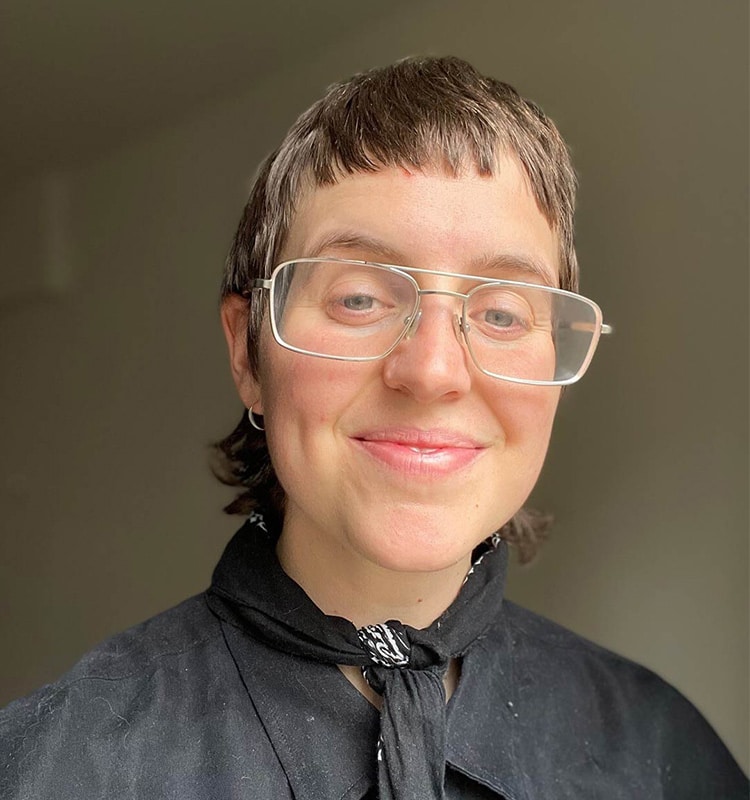Hours of Operation
Therapists: Mon-Sun 8am-11pmAdmin: Mon-Fri 9am-5pm
Nic lachance, MSW, RSW
Locations: Phone/Video
Disciplines: Individual Therapy
Languages: English and French
Top Specialties: Complex PTSD, 2LGBTQIA+, Relationship issues, Emotional Regulation, and Anxiety
Education
- Masters of Social Work, York University
- Bachelors in Arts, Major in Philosophy and Women’s Studies
License and Memberships
- Ontario College of Social Workers and Social Support Workers (OCSWSSW): #848972
About my Credentials
I am a Registered Social Worker, a member of the Ontario College of Social Workers and Social Service Workers (OCSWSSW), and I have a Masters Degree in Social Work from York University.
Hi everyone,
A big, sprawling welcome to you here.
There is so much to say and to give language to, around pain. I start my work by welcoming all of it, as it is, to be in the room with us. The container of our work is pieced together, first and foremost, with a spirit of welcome. To all the discarded, hidden, cautious, exhausted, exiled, and yearning parts of you—welcome. Welcome to your grief and rage and sadness and collapse and joy. Welcome to your body and your story. Welcome to your powerlessness and your confusion. Welcome to the reality of how you experience the world. Welcome to the margins, the centre, the effort, and the impact.
I extend my welcome to you through a reliance on many different modalities, but focusing on three in particular: 1) Somatic therapy techniques and frameworks; 2) Attachment theory, and; 3) Internal Family Systems (IFS), commonly called “parts work.”
1) Somatic therapy is a way of referencing the body, taking inventory of what the body is holding. I rely on the body’s innate knowledge and mechanisms to support you in metabolizing emotions and experiences that may otherwise remain stuck or stagnant.
2) Attachment theory is a framework that emphasizes the shaping and impact of your primary relationships—typically with parents and/or caregivers—and the way they colour how you understand yourself, how you relate to others, your role in relationships, your sense of safety, your identity, and how you fit and belong in the wider world around you.
3) Internal Family Systems (IFS) is a modality developed by Richard Schwartz (derived from and built upon other parts-work modalities) where we understand an individual’s inner system as composed of many different parts. These parts have varying needs, motivation, drives, memories, beliefs, and defenses. A major piece of IFS/parts work is building relationship and dialogue with those parts that may have been silenced or discarded at some point in our lives.
In our sessions, I will invite you to meet yourself through embodiment, care, and understanding. Tending to and rebuilding your inner space and your relationship to yourself is an important element of the work we will do—this is often where serious atrophy and rupture has occurred, and is typically one of the hungriest spaces within us, needing our attention and witnessing.
I am heavily informed and guided by queer, trans, neurodiverse, feminist, and decolonial lineages. Importantly, this does not mean I only serve people who identify along these lines; everyone is welcome in this space, exactly as they are. The way I practice these lineages is dynamic and evolving, always moving with me as I learn and practice; however, one of the ways they are consistently present in my work is through my commitment to find words, stories, and understandings of the self that are outside and beyond lines of violence. At this edge, I use mindfulness, relationality, curiosity, poetry, care, and joy to guide our work together.
I see the therapeutic space as an entryway to new possibilities within the self that carry profound and beautiful reverberations for the wider world.
Please reach out if you have any questions for me.
x
nic
Therapy with nic
As your therapist, my job is to create a comfortable and resilient container for you to discuss what you are needing support with. A session of therapy with me will be laden with warm presence and curiosity about what makes you you. In our first session together, we’ll talk about some relevant background info, your main concerns that you’d like to work on, and your goals for therapy.

